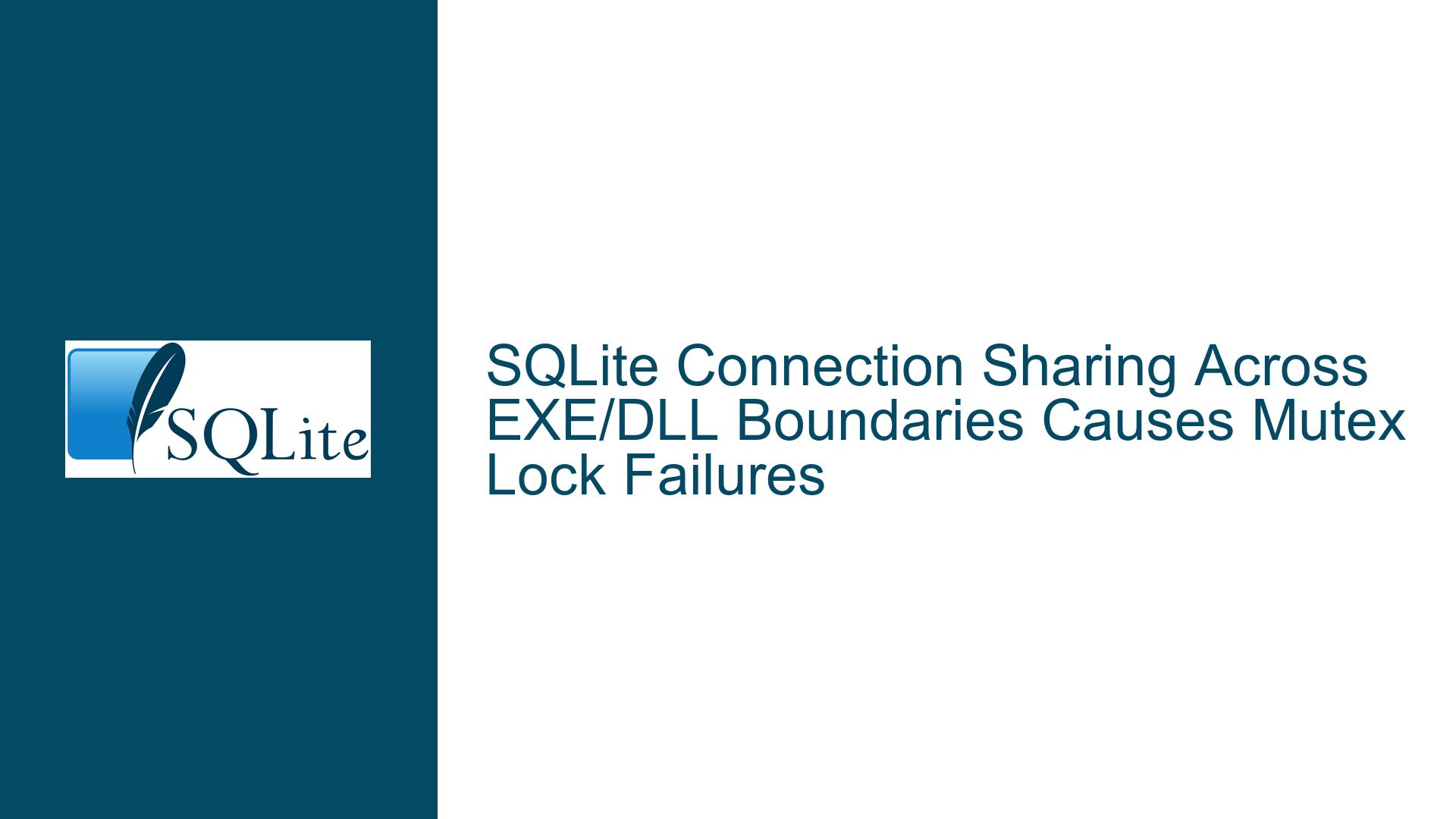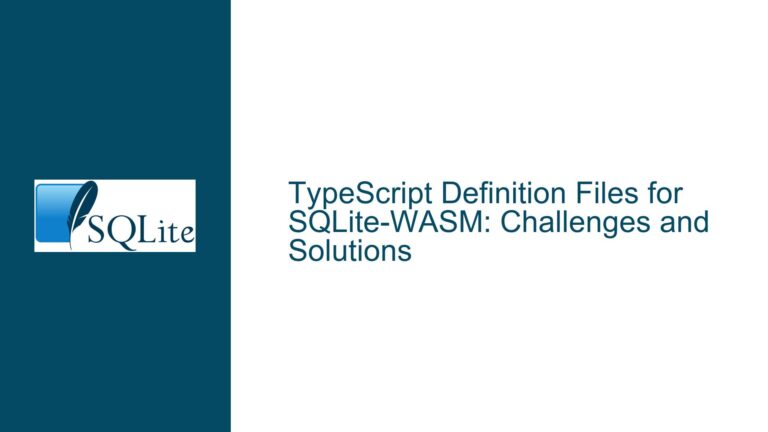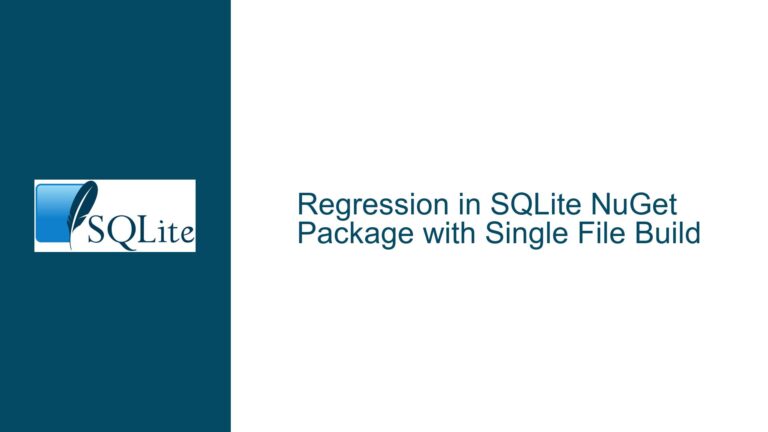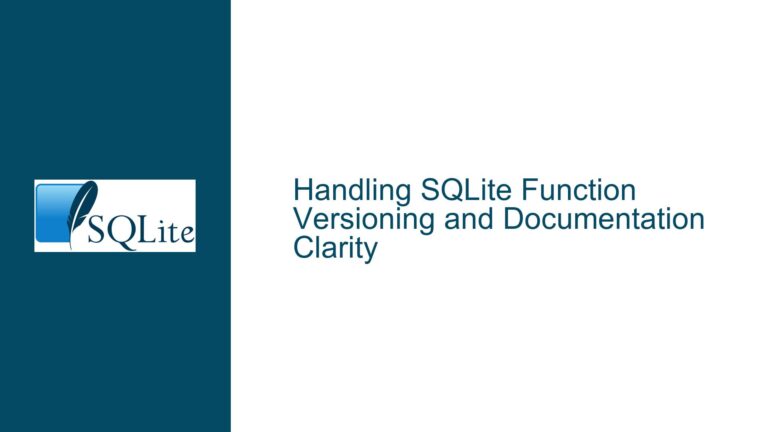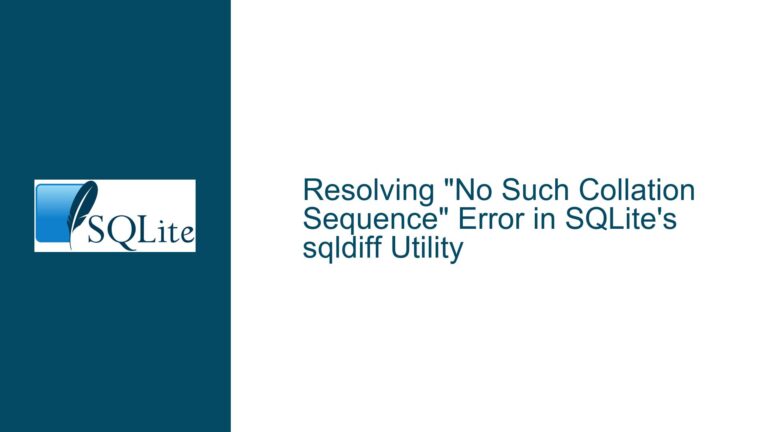SQLite Connection Sharing Across EXE/DLL Boundaries Causes Mutex Lock Failures
Multiple SQLite Instances Causing Thread-Safety Issues in Windows Application
The core issue revolves around a Windows-based MFC application built with C++17 experiencing mutex lock failures when sharing SQLite connections across EXE/DLL boundaries. The application architecture consists of an executable and a DLL component, both utilizing a logging system that processes task objects through a worker thread.
The logging system employs a spooler mechanism to batch approximately 10 tasks at a time, managing database transactions for logging various data types including timestamped values and serial packet information. Each task operates using a lambda function that creates its own prepared statement, while the log spooler provides the SQLite connection and handles transaction boundaries.
The problem manifests as an access violation exception (0xC0000005) during statement preparation, specifically when calling sqlite3_mutex_enter, with the error pointing to address 0x00000000. This crash occurs exclusively during the preparation of statements for BLOB serial data tasks originating from the DLL, despite the actual BLOB binding not yet taking place.
The root cause stems from an architectural oversight where both the EXE and DLL maintain separate instances of SQLite through static library linking. Initially, this setup appeared to work because each component maintained its own SQLite connection to the same database file. However, the issue became apparent when the application was modified to create unique database files per session.
The attempted solution involved having the EXE create the database connection and passing this connection pointer to the DLL. This approach introduced a critical architectural flaw where SQLite objects created in one module (EXE) are being used within another module (DLL) that has its own separate copy of the SQLite static library. The situation is particularly problematic because SQLite relies on static data initialization and maintains internal state that becomes inconsistent when multiple library instances exist within the same process.
This scenario directly relates to known SQLite corruption risks, as documented in SQLite’s documentation regarding running multiple SQLite libraries concurrently within the same process. While the original documentation primarily focuses on Linux and Mac systems due to POSIX lock semantics, the observed mutex failures in this Windows implementation suggest similar underlying architectural constraints.
The problem is exacerbated by the application’s threading model, where tasks originating from the DLL are executed on the EXE’s worker thread while attempting to use SQLite functionality that spans both module boundaries. This cross-boundary interaction with multiple SQLite instances leads to undefined behavior in the mutex locking system, resulting in the observed null pointer dereference during mutex operations.
Architectural and Technical Root Causes Behind SQLite Mutex Lock Failures
SQLite’s mutex locking behavior presents several complex challenges when dealing with multi-threaded and multi-module environments. The core issues stem from SQLite’s internal architecture and how it manages concurrency across different contexts.
Threading Mode Implications
SQLite supports three distinct threading modes, each with specific implications for mutex handling:
| Mode | Description | Mutex Behavior |
|---|---|---|
| Single-thread | All mutexes disabled | Unsafe for multi-threading |
| Multi-thread | Per-connection safety | Safe with connection isolation |
| Serialized | Full thread safety | API calls serialized with mutexes |
The serialized mode, while being the default, can lead to mutex failures when connections cross module boundaries or when static data initialization differs between modules. This becomes particularly problematic when SQLite instances exist in both an EXE and DLL, as each maintains its own copy of static data and mutex structures.
Connection Management Complexities
When database connections are shared across different modules or threads, several critical issues emerge:
Memory Safety Violations: Attempting to use SQLite objects across module boundaries can result in access violations during mutex operations, particularly when calling sqlite3_mutex_enter. This occurs because mutex structures are tied to specific module instances of SQLite.
Static Data Initialization: Each module (EXE/DLL) maintains its own copy of SQLite’s static data, leading to inconsistent state management when connections are shared. This can cause mutex operations to reference invalid memory addresses, resulting in null pointer dereferences.
Thread Context Switching: Moving SQLite connections between threads can trigger mutex failures, especially when the connection was created in one thread but used in another. This is particularly problematic on systems where fcntl() locks are thread-specific.
Database Locking Patterns
The interaction between SQLite’s internal locking mechanisms and mutex operations creates several potential failure points:
Write Lock Conflicts: Multiple threads attempting write operations can trigger SQLITE_BUSY errors when mutex locks prevent concurrent access. This is especially common during BLOB operations and prepared statement creation.
Transaction Boundary Issues: Mutex locks may not be properly released if transactions are not correctly committed or rolled back, leading to database locked states that persist until process termination.
Connection Pool Synchronization: When multiple connections exist across module boundaries, the lack of proper connection pool synchronization can lead to mutex deadlocks, particularly when both modules attempt to acquire locks simultaneously.
These architectural challenges require careful consideration of connection lifecycle management and proper implementation of thread-safe access patterns to prevent mutex-related failures in SQLite applications.
Implementing Thread-Safe SQLite Access in Multi-Module Applications
Connection Management Strategy
The most robust approach for handling SQLite connections across module boundaries involves implementing a dedicated connection management system. Each thread should maintain its own SQLite connection, with proper synchronization mechanisms in place.
| Connection Type | Implementation | Use Case |
|---|---|---|
| Thread-Local | One connection per thread | High concurrency requirements |
| Connection Pool | Managed set of connections | Balanced performance/resource usage |
| Single Shared | Mutex-protected single connection | Simple applications |
Code Implementation Example
For thread-safe database operations, implement a connection manager that handles connection lifecycle and transaction boundaries:
class SQLiteConnectionManager {
private:
std::mutex connectionMutex;
sqlite3* db;
public:
void executeQuery(const std::string& query) {
std::lock_guard<std::mutex> lock(connectionMutex);
sqlite3_stmt* stmt;
if (sqlite3_prepare_v2(db, query.c_str(), -1, &stmt, nullptr) == SQLITE_OK) {
sqlite3_step(stmt);
sqlite3_finalize(stmt);
}
}
};
Transaction Management
Proper transaction handling is crucial for maintaining data integrity across module boundaries. Implement transaction management using WAL mode for better concurrency:
void beginTransaction() {
sqlite3_exec(db, "PRAGMA journal_mode=WAL", nullptr, nullptr, nullptr);
sqlite3_exec(db, "BEGIN IMMEDIATE TRANSACTION", nullptr, nullptr, nullptr);
}
Performance Optimization Techniques
Connection Pooling Configuration
Set appropriate pool sizes based on workload:
const int POOL_SIZE = std::thread::hardware_concurrency();
sqlite3_config(SQLITE_CONFIG_MULTITHREAD);
sqlite3_config(SQLITE_CONFIG_MEMSTATUS, 1);
Statement Caching
Implement prepared statement caching to reduce parsing overhead:
class PreparedStatementCache {
std::unordered_map<std::string, sqlite3_stmt*> stmtCache;
sqlite3_stmt* getStatement(const std::string& sql) {
auto it = stmtCache.find(sql);
if (it == stmtCache.end()) {
sqlite3_stmt* stmt;
sqlite3_prepare_v2(db, sql.c_str(), -1, &stmt, nullptr);
stmtCache[sql] = stmt;
return stmt;
}
return it->second;
}
};
Error Handling and Recovery
Implement comprehensive error handling for connection and transaction failures:
class SQLiteException : public std::runtime_error {
public:
SQLiteException(const char* message, int errorCode)
: std::runtime_error(formatMessage(message, errorCode)),
errorCode(errorCode) {}
private:
int errorCode;
static std::string formatMessage(const char* message, int errorCode) {
return std::string(message) + ": " + sqlite3_errstr(errorCode);
}
};
Module Boundary Protection
Implement safeguards for cross-module database access:
class ModuleBoundaryGuard {
private:
std::atomic<bool> isInitialized{false};
public:
void initializeDatabase() {
bool expected = false;
if (isInitialized.compare_exchange_strong(expected, true)) {
// Perform one-time initialization
configureDatabaseSettings();
}
}
};
Connection Lifecycle Management
Handle connection creation and cleanup properly across module boundaries:
class ConnectionLifecycle {
public:
static void initialize() {
sqlite3_initialize();
sqlite3_config(SQLITE_CONFIG_SERIALIZED);
}
static void shutdown() {
sqlite3_shutdown();
}
};
This comprehensive approach ensures thread-safe database operations while maintaining optimal performance and reliability across module boundaries.
